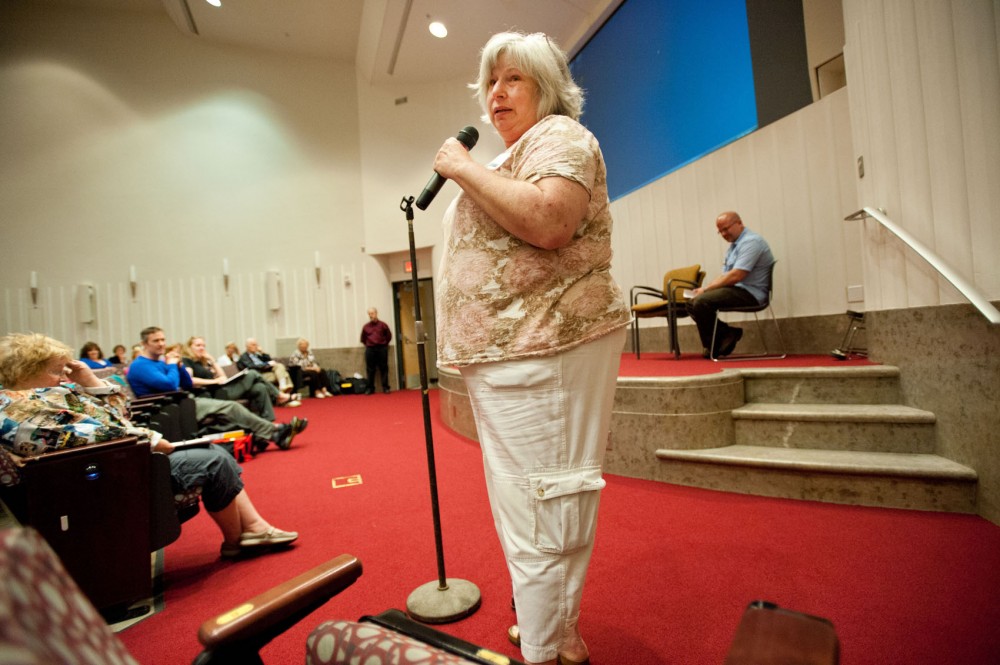University of Minnesota lecturer Lynn Von Korff was so moved by the presentations at the School of Nursing’s conference on caring for people with memory loss that she skipped lunch to stay and soak up every last bit of conversation.
She said she needed to. The very next day, she traveled to see a loved one struggling with the effects of memory loss.
Her relative had stopped eating and lost 15 pounds the last time Von Korff visited. Von Korff said with what she learned at the conference, she felt better prepared for whatever she might find.
The conference provided education and support for the 300 caregiving professionals and families in attendance.
Doctors, researchers and professionals spoke before taking audience questions, which led to tears for many.
Audience members explained their loved ones’ memory loss and sought advice.
“How do I take the car away?”
“At what point do you stop trying to push the exercises?”
“How do you handle one parent’s negative emotions towards another?”
‘I could be in the audience someday’
Dr. Joseph Gaugler, an associate professor in the School of Nursing and co-founder of the conference, said audience feedback helps center the presentations around the needs of the caregivers in the audience, giving them practical information they can use.
“The way Alzheimer’s is, and the way it’s trending … I could be in the audience someday,” Gaugler said.
The conference was initially started in 2008 as a way to recruit participants for studies on aging, he said.
Mark Reese, a study counselor and co-founder of the conference, said attendees surprise him every time with their strength in caring for their loved ones.
“It’s not so much the presentations, it’s the audience members and the stories we hear,” he said.
Reese became a study counselor because of his experience caring for his mom with memory loss and his dad, who had a brain tumor.
Reese said his family chose him to care for both parents for almost a year and then his mother for another 11 years in rural Minnesota after his dad died.
Shortly after his mother’s death, he took two years to recover from caregiving. Reese then got his master’s in counseling and came to the University to practice.
His caregiver patients feel better taking advice from someone who has experienced their struggle, he said.
“I’ve done six months on two hours of sleep a night,” Reese said. “It’s that type of being able to connect and credibility that really helps.”
‘Profound teachers’
Presenter Rev. Marty Jones, who’s chaplain of the Walker Methodist home for seniors in Minneapolis, told stories from years of experience, which rang true for many audience members, causing tears and sometimes laughter.
“I used up all my Kleenex, so I don’t know if I can cry later this afternoon,” audience member Jane McClain said after Jones’ presentation.
Jones, a self-described student of people with memory loss, encouraged the audience to find the positive aspects of the situation and to find what their loved ones could still do.
Art, music and humor were three things that Jones said weren’t often affected by memory loss.
Joseph Manthei said his mother, who has memory loss and lives in a memory care facility, can still remember how to cook.
Presenter Judy Berry, CEO, founder and director of memory loss home Lakeview Ranch, said her staff members bring a resident to the piano every day. Though the resident insists she doesn’t know how to play, when a staff member puts her hands on the keys, she plays beautifully, Berry said.
Feeling ‘invisible’
Many of the attendees expressed their frustrations with under-qualified doctors, the high cost of geriatric care, understaffed facilities and the “invisible feeling” of caregiving.
“They give up a career, which in our culture is so important for our self-identity, and then our culture really doesn’t recognize all the skills it takes to do this,” Reese said.
Manthei said his mother’s doctor in rural Minnesota was not trained to treat her memory loss.
“There was a gap in coverage between being in a hospital geriatric site with an in-patient psychiatrist and then being discharged to her regular doctor, who doesn’t know about what to do,” he said.
The conference helped attendees with their frustrations and provided support for people coping with the death of loved ones. During breaks, people grouped to tell each other stories and gave advice on what to do.
Both Jones and Berry told stories of people they had lost and shared what they learned in the process.
Berry talked about Harold, a former resident who asked her if he could stop getting medical attention so he could die naturally.
“I want you to look at my death in a whole different way,” he told her, “and look at it as a privilege to help me with this very last transition.”
Von Korff said she will have to face what her relative might decide, and she did not want to make that decision for her.
After an emotionally draining day, Von Korff struggled to find the words to describe the next day’s trip.
“It’s hard,” she said, fighting back tears. “This is really hard.”


